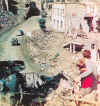
PLACE
OF MEMORY
Villebaudon
- Beaucoudray (Manche)
War
Memorial erected at the place where on the
15 june 1944, eleven members of the
French resistance (Saint-Lô Postal Department)
were executed by the Germans
A
page from the history of the French Resistance or how a network died..
On
the 15th of June 1944 on a grassy bank in the hedgerow country not far from the
small village of Beaucoudray, in the cool dawn of one of the longest days in the
year, eleven members of the Saint-Lô postal department network were executed by
a German firing squad. This was the tragic end to a plan that has been put
together over a long period and carried out during the night of the 5th and 6th
of June 1944. It was part of the " purple plan " which envisaged the
systematic sabotage of German telephone links. This plan should have been
carried on behind enemy lines but shortages of manpower and equipment in
particular, made the task impossible.
Others have written at length about the activities of the resistance group set up in Saint-Lô, as early as the end of 1940, by Marcel Richer and recruited mainly from postal workers whose first objective was inform the allies of the state of the German defence network: sentry posts, anti-aircraft batteries and troop movements, then to engage in sabotage, and finally to offer technical and armed back-up behind enemy lines when these would be breached. Reinforcements would be provided by paratroopers to achieve concerted action.
Unfortunately,
the vital reinforcements expected from the Special Air Service did not
materialize. The postmen, isolated in a farm in the village of le Bois where
they had taken refuge after cutting the thick German cables, could do nothing
but wait. The break-through did not come. Gossip, idle talk and maybe a lack of
precautions, enabled a group of
German
non-combattants, who were stationed in the nearby village of La Reauté, to
track down some young men whose behaviour seemed very different to that of the
villagers.
At
daybreak on the 14th June, a German motor patrol went right up to the farm where
the men were spending the night Nothing happened. A mistake, the men had lost
their way... wrong... at 10.30 the non-combattants, backed up by a large number
of SS men, arrived with machine-gun batteries. The farm was quickly surrounded.
The resistance group's guard was taken by surprise and over come as were nine
other men who were inside getting lunch ready. Shots rang out. Guy, a resistance
groupe member, fell to the ground with a bullet in his thigh. Ernest Pruvost the
national group-leader, who was just finishing shaving outside, was able to melt
away into the pentiful undergrowth that grew around the farm at that time. Three
others managed to do the same: Richer, Deschamps and Raoult.
When
ordered to put his hands up, Crouzeau succeeded in shooting down his opponent
which his Colt but then had to surrender like the others. This earned him the
doubtful privilege of being considered the leader. After lengthy questionings
and attempts to save his men, Crouzeau declared openly to his interrogators: We
are against you". Madame Leblond and her eleven-year-old son, to whom the
thankless task of keeping watch over the approaches to the farm had been
assigned, were also interrogated at length. By somme unaccountable and
unforeseen mercy they were to escape execution.
Aware
that the group was far larger than expected and that many local inhabitants were
involved in the plan, the Germans mounted a search, sealing off the area,
questioning everyone they met who might have been a suspect. Alphonse Fillatre
with his wife and a young relative, managed to outwit the Nazis and escape from
the hounds set upon them to track them down.
They
were warned just in time by a young, local boy, Bernard Lalleman.
The
search was in vain. No other resistance groupe members were to be found. But
might not the network be reformed ? And might not paratroopers descend from the
sky to save the resistance fighters? Enough was enough. At nightfall, after a
grim day on which allied air power had been particularly active, the Germans
decided to transfer their prisoners to the village of La Reauté. They were
locked up in a stable and carrefully guarded.
June
15th ...4 a.m... the sudden starting up of a lorry
...gutturaux. orders. A few minutes later... a long burst of machine-gun
fire as day is dawning ... eleven men have ceased to exist.
The
bodies of the hapless victims were found after the liberation at the beginning
of August: four on one side, sever on the other, at the exact spot where the
monument stands. They had been tied together in pairs. One was wearing an FFI
arm-band, a barren reminder that he belonged to that shadowy army the Germans
were never to acknowledge.
Every year, on the first Sunday after the 15th June, a crowd, always a large one, gathers to attend the memorial service. Perhaps to exemplify the poet's words : " Where I die my country is born again ".
La
douleur m'a brisé
La
fraternité m'a relevé
De
ma blessure a jailli un fleuve de liberté